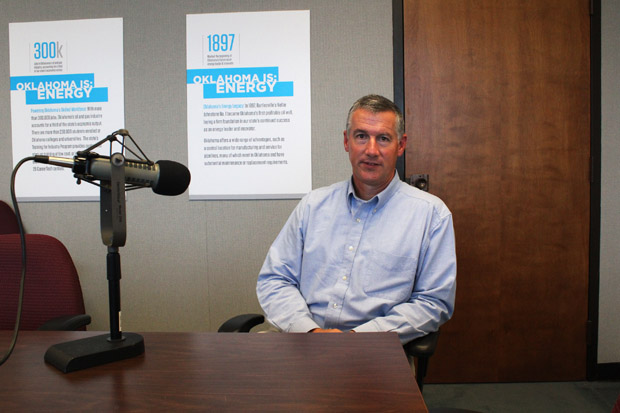
Ret. Col. Michael Teague, Secretary of Energy and Environment
Joe Wertz / StateImpact Oklahoma


Ret. Col. Michael Teague, Secretary of Energy and Environment
Joe Wertz / StateImpact Oklahoma
The fact that lakes in eastern Oklahoma are full, and last year was wetter than normal for many areas of the state makes some people think the three-year drought is over.
Those people would be wrong, according to state Secretary of Energy and Environment Michael Teague.
Teague joined Oklahoma Water Resources Board Executive Director J.D. Strong Friday at the state capitol for a press conference updating the state’s drought situation.
Teague says nearly two-thirds of the state are experiencing some degree of drought — especially in the southwest. As The Journal Record‘s M. Scott Carter reports, the demand for water in southern Oklahoma and north Texas is forcing the two states to work together:
Teague said the problem was so bad that Republican Gov. Mary Fallin and Republican Gov. Rick Perry recently signed a memorandum of understanding, pledging to continue to abide by the Red River Compact and use only shares of water allowed under the agreement.
… Last year, the Supreme Court of the United States ruled 9-0 against the Tarrant Regional Water District in its lawsuit against Oklahoma over the amount and type of water it could take from the Red River. Tarrant had complained that its share of the Red River water contained too much salt and was unusable without expensive water treatment.
Teague says drought effects have worked their way along the Red River Basin, with Lake Texoma now seriously reeling.
For his part, J.D. Strong focused on encouraging increased conservation efforts, saying the goals set out in the Water for 2060 Act could be achieved — but not easily:
Under the act, the state has set a goal of using no more water in 2060 than is being used today, despite increased demand.
“We’ll accomplish that, hopefully, by encouraging more conservation and efficiency, working hard through incentives and educational programs, as well as looking at ways that we can help folks make costly upfront investments that sometimes are required in order to use the water we have more efficiently,” he said.
StateImpact has extensively covered how difficult and expensive it is for small communities to make necessary updates to their water systems, and what the state is doing to help.
Gov. Mary Fallin chimed in about the drought on Friday as well, saying even small efforts — like fixing leaky faucets and not watering the lawn so much — could help keep lakes healthy.